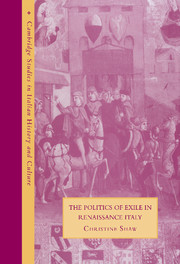3 - Places of exile
Published online by Cambridge University Press: 31 July 2009
Summary
Deciding where exiles would be ordered to go was an important matter. Those making the decision had to take into account what element of punishment (other than being banished from home) it was intended to inflict. Was it intended to make it possible for the exiles to have a comfortable life, to earn their living if need be, or should they be made to struggle for money, and be deprived of congenial society? And then there was the question of how dangerous they were considered to be, how likely it was that they would be obedient. Would it be safer to keep them within the jurisdiction of the state, so that they could be supervised by its own officials, or should they be sent well away? Might a place of exile be chosen in the expectation, perhaps the hope, that the exiles would not want to go or stay there, and would thus lay themselves open to a sentence of rebellion? Or should they be sent to a place that would suit them, where they might have property, and family and friends, and would this encourage them to be obedient?
For the exiles, whether to go where they were ordered to go, and whether to stay there if they went, were also important questions. Not going to the assigned place of exile, or leaving it without permission before the sentence had expired, were grounds for condemnation as a rebel.
- Type
- Chapter
- Information
- The Politics of Exile in Renaissance Italy , pp. 87 - 109Publisher: Cambridge University PressPrint publication year: 2000



